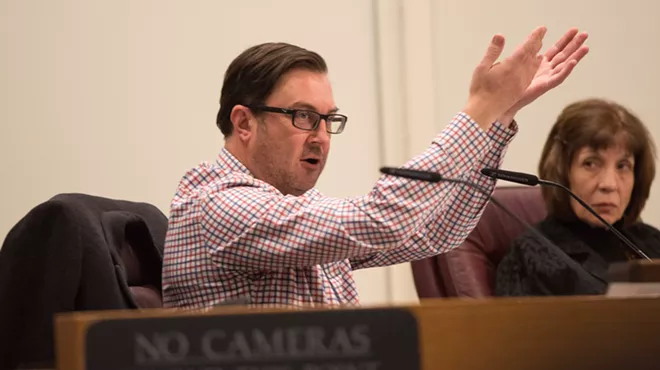"We got a call probably about the third week of July," Stone says. "'You better hurry up and get your paperwork turned in.'"
Stone, you see, was getting ready to apply for $300,000 in "Projects of City Wide Significance" funds for the Falls, his high-end mixed-use tower on the north bank of the Spokane River. It was only a fraction of the $70 million cost of the project, he says, but it allowed him to spruce up the public pieces of the project, like street lighting, landscaping and underground power lines.
But Stone says his City Hall sources told him that his cinematic pursuits risked putting that incentive in jeopardy.
"'City Council has heard that Larry Stone is making a video and they don’t like it,'" Stone recalls hearing. "'And if they don’t like the video they may take away the incentive.'"
Stone says that his employees hurried to fill out the paperwork in time.
And sure thing, at this week's "Urban Experience" meeting, City Council President Ben Stuckart — who Stone had previously endorsed for mayor before changing his position to "neutral" — floated an idea after a presentation by the Spokane Regional Health District: Take the money that would have been going to development projects, including Stone's, and spend it on drug treatment services instead.
Stuckart didn't hide the fact that it had to do with Stone's "Curing Spokane" video. But he denied that it was meant as retaliation. Shifting the money away from Stone's project was actually responding to Stone's concerns.
"Someone was pointing out a problem, and I’m trying to fix it," Stuckart says. "The person who developed that video thought it was a big enough problem to spend $100,000 on the video... He’s pointing out problems to say we're not doing enough. So I’m trying to do something."
The Projects of City Wide Significance fund was created after the city of Spokane refinanced its bonds for the River Park Square parking garage mess. With about $1.8 million in the pool, the city has spent it to incentivize projects like the M, the Wonderbread Building, the Ridpath and the Otis Hotel. Awarding funds has not been arbitrary — the city uses a 150-point scale that looks at things like "jobs created" to determine how much money each project gets.
In January, Stuckart helped lead the charge to award extra points for multifamily housing when awarding revenue from the funds. It includes Stone's project: At 23 stories, the Falls would be the tallest multifamily structure in the city, including 23 condos and 101 apartments.
If the funding is diverted to drug treatment, it wouldn't just mean $300,000 less for Stone's project. It would also mean $164,000 less for developer Rob Brewster's McKinley school project. Stuckart launched his campaign from the school last year, citing the development as a symbol of Spokane — unfinished, but rife with potential. Yet, as sometimes tends to happen with metaphors, the conceit backfired. The project has been stalled, the Spokesman-Review reported, delayed by finance and slower-than-expected construction of a nearby city stormwater tank. Worse, the Spokesman learned Brewster had four years of unpaid taxes on the property until the newspaper contacted the developer.
Stuckart had been a major champion for developer incentives, even amid criticism from some of his left-wing allies. It was Stuckart who came up with the Targeted Investment Renewal program in 2013.
Stone, as part of the East Spokane Business Association, had been a major proponent of using targeted investment dollars to improve the East Sprague area.
"I was probably like a lot of people who drove through Sprague and said, 'What a dump,'" Stone recalls. "But I really fell in love with the area."
Last year, Stuckart praised Stone. He praised Stone's "smart economic development projects" and landscape ideas.
"I’ve known Larry Stone for several years," Stuckart wrote on Facebook in December, celebrating Stone's endorsement. "Larry loves our city. He’s been instrumental in the redevelopment of the East Sprague area. He has been part of the Targeted Investment program from day one."
But lately, Stuckart's rhetoric about Stone has been different. Stone says Stuckart confronted him before the "Curing Spokane" video came out and asked him if the video would be similar to the fiery "Seattle is Dying" video produced by KOMO earlier this year.
“No, it’s going to be very different about that,” Stone recalls telling Stuckart. “‘It’s going to be a positive video."
Stuckart, to understate things a bit, did not feel it was a positive video. He accused Stone of doing "damage to our community" and "embarrassing, inciting, and shaming our people to make a political point."
"I had no idea that Ben would react this way," Stone says. He says he hasn't heard from Stuckart since the video came out.
As recently as last month Stuckart had argued that the Projects of City Wide Significance funds had resulted in major successes.
"It’s resulting in housing," Stuckart told the Spokesman. "We desperately need more housing in our community."
But today, Stuckart's rhetoric is decidedly more skeptical about whether the funding has been worth it.
"I keep hearing about other problems that people say are more pressing," Stuckart says. "Staff administration, council, all had questions with any of these projects: 'Would they have all happened without this program?'"
In the case of the Falls project, Stone says that the multifamily tax exemption incentive package was crucial. The project wouldn't be possible without them. But as for the $300,000 from the Projects of City Wide Significance fund? It could happen either way.
"I think it just gives you a chance to do better infrastructure improvements on public property," Stone says. "But you can see as part of the total, it's a pretty small percentage."
Asked if he viewed the video as "retaliation," Stone says that was the second-hand impression he got from conservative City Councilman Mike Fagan, but that he didn't have any first-hand knowledge of the meeting.
Gavin Cooley, the chief financial officer for the city of Spokane, cautions that a council member floating an idea doesn't necessarily mean anything will change.
"I hear things off the cuff like all the time like that," Cooley says. "I take a step back and take a grain of salt like that."
He wouldn't be surprised if nothing ultimately comes from Stuckart's suggestion.
Meanwhile, Stuckart's opponent, Nadine Woodward, has been happy to use "Curing Spokane" to underscore her view that "downtown crime and our addiction crisis is driving businesses to leave our economic center and keeping residents from enjoying our incredible restaurants, wineries, breweries and stores."
But she's been less eager to discuss Stone's proposed solutions, which include moving the downtown STA Plaza, possibly underground.
Following another reporter's question after last week's Homeless Coalition forum, the Inlander attempted to press Woodward on one of Stone's solution.
"Should we move the STA plaza?" the Inlander asked Woodward.
"I'm going to go," Woodward responded. "See ya."


























